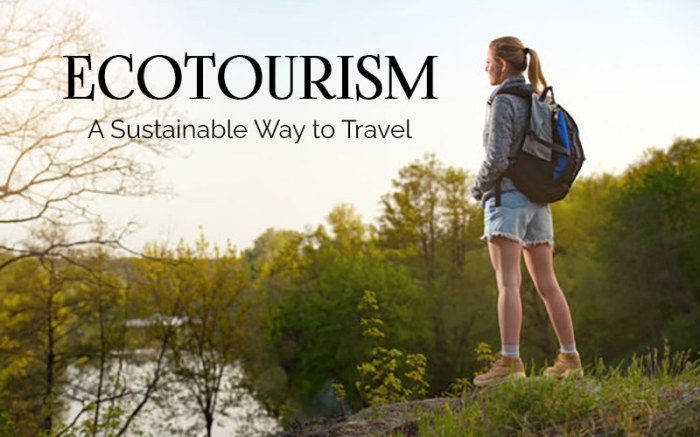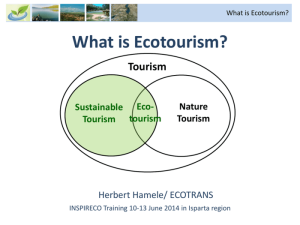
Embark on a journey with Ecotourism for Sustainable Travel as we delve into the principles, benefits, and practices that shape responsible tourism. Discover how ecotourism not only preserves nature but also empowers local communities for a brighter future.
Ecotourism

Ecotourism is a form of sustainable travel that focuses on visiting natural areas to conserve the environment, respect local cultures, and promote conservation efforts. It involves responsible travel practices that minimize the negative impact on the environment and contribute to the well-being of local communities.
Importance of Ecotourism
Ecotourism plays a crucial role in promoting sustainable travel by raising awareness about environmental conservation, supporting local economies, and preserving biodiversity. It helps to protect natural habitats, wildlife, and cultural heritage, while providing meaningful experiences for travelers.
- Ecotourism encourages environmental conservation and sustainable development by supporting eco-friendly practices and minimizing carbon footprints.
- It promotes the protection of endangered species and habitats by funding conservation projects and wildlife reserves.
- Ecotourism creates economic opportunities for local communities through job creation, cultural exchange, and the sale of local products.
Examples of Successful Ecotourism Initiatives
There are several successful ecotourism initiatives around the world that have made a positive impact on the environment and local communities.
- The Galapagos Islands in Ecuador have implemented strict regulations to protect the unique biodiversity of the archipelago while providing sustainable tourism opportunities for visitors.
- Costa Rica is known for its extensive network of national parks and protected areas that offer eco-friendly accommodations and guided tours to showcase the country’s rich biodiversity.
- In Kenya, community-based ecotourism initiatives like the Maasai Mara Conservancies empower local communities to benefit from tourism revenue while conserving wildlife and preserving cultural traditions.
Benefits of Ecotourism
Ecotourism offers a wide range of benefits, not only for travelers but also for the environment and local communities. By choosing sustainable travel options, tourists can actively contribute to the conservation of natural resources and ecosystems, while also supporting the well-being of indigenous communities and wildlife.
Conservation of Natural Resources
Ecotourism plays a crucial role in the conservation of natural resources by promoting responsible travel practices that minimize negative impacts on the environment. Through initiatives such as wildlife protection programs, habitat restoration projects, and sustainable tourism practices, ecotourism helps preserve biodiversity and protect fragile ecosystems for future generations.
Economic Benefits for Local Communities
One of the key advantages of ecotourism is its ability to generate economic opportunities for local communities living in and around ecotourism destinations. By providing jobs in the tourism industry, supporting local businesses, and investing in community development projects, ecotourism helps alleviate poverty and improve the quality of life for residents in these areas.
Raising Awareness about Environmental Issues
Through educational programs, guided tours, and interactive experiences, ecotourism helps raise awareness about pressing environmental issues such as climate change, deforestation, and wildlife conservation. By engaging with local experts and conservationists, travelers gain a deeper understanding of the importance of protecting the environment and are inspired to take action in their own lives to support sustainability efforts.
Sustainable Practices in Ecotourism
Ecotourism focuses on incorporating sustainable practices to minimize its impact on the environment and local communities. By implementing eco-friendly initiatives, ecotourism strives to preserve natural resources and promote conservation efforts.
Waste Management and Energy Conservation
- Proper waste disposal: Ecotourism sites often have recycling programs and waste management strategies in place to reduce the amount of waste generated by tourists.
- Energy-efficient practices: Accommodations and facilities in ecotourism destinations utilize renewable energy sources, energy-saving appliances, and sustainable building materials to minimize energy consumption.
- Water conservation: Ecotourism sites promote water-saving techniques such as low-flow fixtures, rainwater harvesting, and water reuse systems to conserve this precious resource.
Minimizing Carbon Footprint
- Carbon offset programs: Some ecotourism operators invest in carbon offset projects to neutralize the carbon emissions produced by transportation and activities during the trip.
- Alternative transportation: Encouraging visitors to use public transportation, bicycles, or electric vehicles helps reduce the carbon footprint associated with travel to and within ecotourism destinations.
- Carbon-conscious practices: Eco-friendly tours and activities are designed to minimize carbon emissions and promote sustainable transportation options.
Role of Local Communities
- Partnerships with locals: Ecotourism initiatives collaborate with indigenous communities and local residents to ensure that sustainable practices are integrated into tourism operations.
- Empowerment and education: Local communities are involved in decision-making processes, benefit-sharing mechanisms, and educational programs to enhance their participation in sustainable ecotourism practices.
- Cultural preservation: By involving local communities in ecotourism activities, their cultural heritage and traditions are safeguarded, creating a sense of pride and ownership among residents.
Ecotourism Destinations

Ecotourism destinations offer unique experiences that allow travelers to connect with nature, wildlife, and local cultures while promoting sustainability and conservation efforts.
Popular Ecotourism Destinations and their Unique Features
Many ecotourism destinations around the world stand out for their biodiversity, stunning landscapes, and commitment to sustainable practices. Here are some popular ecotourism destinations and their unique features:
- Costa Rica: Known for its rich biodiversity, Costa Rica offers opportunities for wildlife spotting, rainforest exploration, and sustainable eco-lodges.
- Galapagos Islands: Famous for its unique wildlife species, such as giant tortoises and marine iguanas, the Galapagos Islands are a top destination for nature lovers and conservation enthusiasts.
- Borneo: Home to diverse ecosystems, including lush rainforests and endangered species like orangutans, Borneo provides unforgettable wildlife experiences and opportunities for responsible ecotourism.
Types of Ecotourism Experiences
Ecotourism offers a variety of experiences that cater to different interests and preferences. Whether you enjoy wildlife safaris, nature walks, or cultural immersion, there is an ecotourism experience for everyone:
- Wildlife Safaris: Embark on guided tours to observe and learn about wildlife in their natural habitats, promoting conservation and respect for animals.
- Nature Walks: Explore pristine landscapes, forests, and mountains while learning about local flora and fauna from experienced guides.
- Cultural Immersion: Immerse yourself in local communities, traditions, and customs to gain a deeper understanding of the connection between people and the environment.
Preserving Biodiversity in Ecotourism Destinations
Preserving biodiversity is crucial for the long-term sustainability of ecotourism destinations. By implementing conservation measures and sustainable practices, ecotourism destinations can protect fragile ecosystems and endangered species:
- Implementing strict regulations to limit visitor impact on sensitive habitats and wildlife populations.
- Supporting local conservation initiatives and community-based projects to preserve biodiversity and promote sustainable development.
- Educating visitors about the importance of biodiversity conservation and responsible tourism practices to raise awareness and foster a culture of sustainability.
In conclusion, Ecotourism for Sustainable Travel stands as a beacon of hope for a more sustainable and responsible way of exploring our planet. By embracing ecotourism, we pave the way for a harmonious coexistence between travelers, nature, and local communities.
FAQ Corner
How can ecotourism benefit local communities?
Ecotourism provides economic opportunities, supports local businesses, and encourages cultural preservation within communities.
What are some popular ecotourism destinations?
Popular ecotourism destinations include Costa Rica, Galapagos Islands, and Kenya for their diverse ecosystems and conservation efforts.
How does ecotourism help in raising awareness about environmental issues?
Ecotourism educates travelers about the importance of conservation, biodiversity, and sustainable practices, fostering a deeper understanding of environmental issues.





